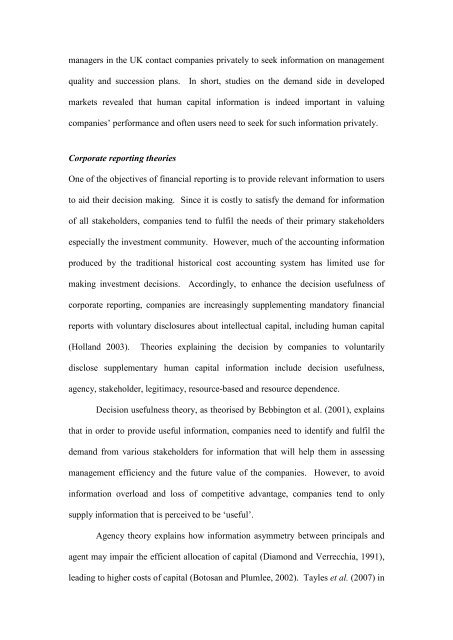Huang, C. , Luther, R. , Tayles, M. and Haniffa, R. - UWE Research ...
Huang, C. , Luther, R. , Tayles, M. and Haniffa, R. - UWE Research ...
Huang, C. , Luther, R. , Tayles, M. and Haniffa, R. - UWE Research ...
You also want an ePaper? Increase the reach of your titles
YUMPU automatically turns print PDFs into web optimized ePapers that Google loves.
managers in the UK contact companies privately to seek information on management<br />
quality <strong>and</strong> succession plans. In short, studies on the dem<strong>and</strong> side in developed<br />
markets revealed that human capital information is indeed important in valuing<br />
companies‟ performance <strong>and</strong> often users need to seek for such information privately.<br />
Corporate reporting theories<br />
One of the objectives of financial reporting is to provide relevant information to users<br />
to aid their decision making. Since it is costly to satisfy the dem<strong>and</strong> for information<br />
of all stakeholders, companies tend to fulfil the needs of their primary stakeholders<br />
especially the investment community. However, much of the accounting information<br />
produced by the traditional historical cost accounting system has limited use for<br />
making investment decisions. Accordingly, to enhance the decision usefulness of<br />
corporate reporting, companies are increasingly supplementing m<strong>and</strong>atory financial<br />
reports with voluntary disclosures about intellectual capital, including human capital<br />
(Holl<strong>and</strong> 2003). Theories explaining the decision by companies to voluntarily<br />
disclose supplementary human capital information include decision usefulness,<br />
agency, stakeholder, legitimacy, resource-based <strong>and</strong> resource dependence.<br />
Decision usefulness theory, as theorised by Bebbington et al. (2001), explains<br />
that in order to provide useful information, companies need to identify <strong>and</strong> fulfil the<br />
dem<strong>and</strong> from various stakeholders for information that will help them in assessing<br />
management efficiency <strong>and</strong> the future value of the companies. However, to avoid<br />
information overload <strong>and</strong> loss of competitive advantage, companies tend to only<br />
supply information that is perceived to be „useful‟.<br />
Agency theory explains how information asymmetry between principals <strong>and</strong><br />
agent may impair the efficient allocation of capital (Diamond <strong>and</strong> Verrecchia, 1991),<br />
leading to higher costs of capital (Botosan <strong>and</strong> Plumlee, 2002). <strong>Tayles</strong> et al. (2007) in

















